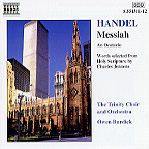On January 16, 1770, as revolution was brewing in England’s North American colonies, “an extract from Mr. Handel’s Grand Oratorio, called the Messiah, consisting of the Overture and sixteen other pieces, never performed in America” was presented in the George Burns Music Room, New York City. Later that year, another performance of Messiah extracts took place at New York’s Trinity Church, the same venue in which this recording was made. This historical connection suggests a nifty premise on which to make yet another recording of this most popular of all large-scale choral works. Does the world really need another Messiah? Considering the exhaustive research, the documentary and anecdotal evidence, and the sheer numbers of ways the work already has been performed and recorded–more than three dozen complete versions and nearly as many “highlights” recordings saturate the catalog–there’s probably no serious qualitative or musicological reason for another entry. But we just might like the sheer pleasure of hearing a fresh reading by singers, an orchestra, and/or a conductor we respect.
While this recording is not likely to blow anyone away with virtuosity, new insights, or even superior sound quality, it’s a good middle of the road performance whose authority and ultimately its overall appeal reside in its very fine choir, decent orchestra, and competent-to-excellent soloists. Conductor Owen Burdick, who has quite a reputation as a composer and as an advocate for contemporary music, is not very convincing in his vision of Handel’s Baroque masterpiece. Tempos are sometimes very quirky (at least Burdick never can be accused of speeding), and decisions concerning dynamics are sometimes puzzling–the extremely quiet and agonizingly slow opening to the Overture and the weirdly shaped “And with his stripes”, for example, as well as occasional strange emphases on downbeats that don’t seem to have any purpose. Some of the choruses (“His yoke is easy”) never find a comfortable, cohesive tempo. Happily, the soloists don’t indulge in annoying, idiosyncratic ornaments that lose their effect after a few hearings. In fact, the soloists, who also are members of the choir, are more compatible and pleasant to listen to than many big name professionals. The sound is okay, but we notice the cavernous space too much, and the orchestra sometimes sounds too far forward. For its price, this Messiah offers an articulate if sometimes oddly nuanced reading.
































